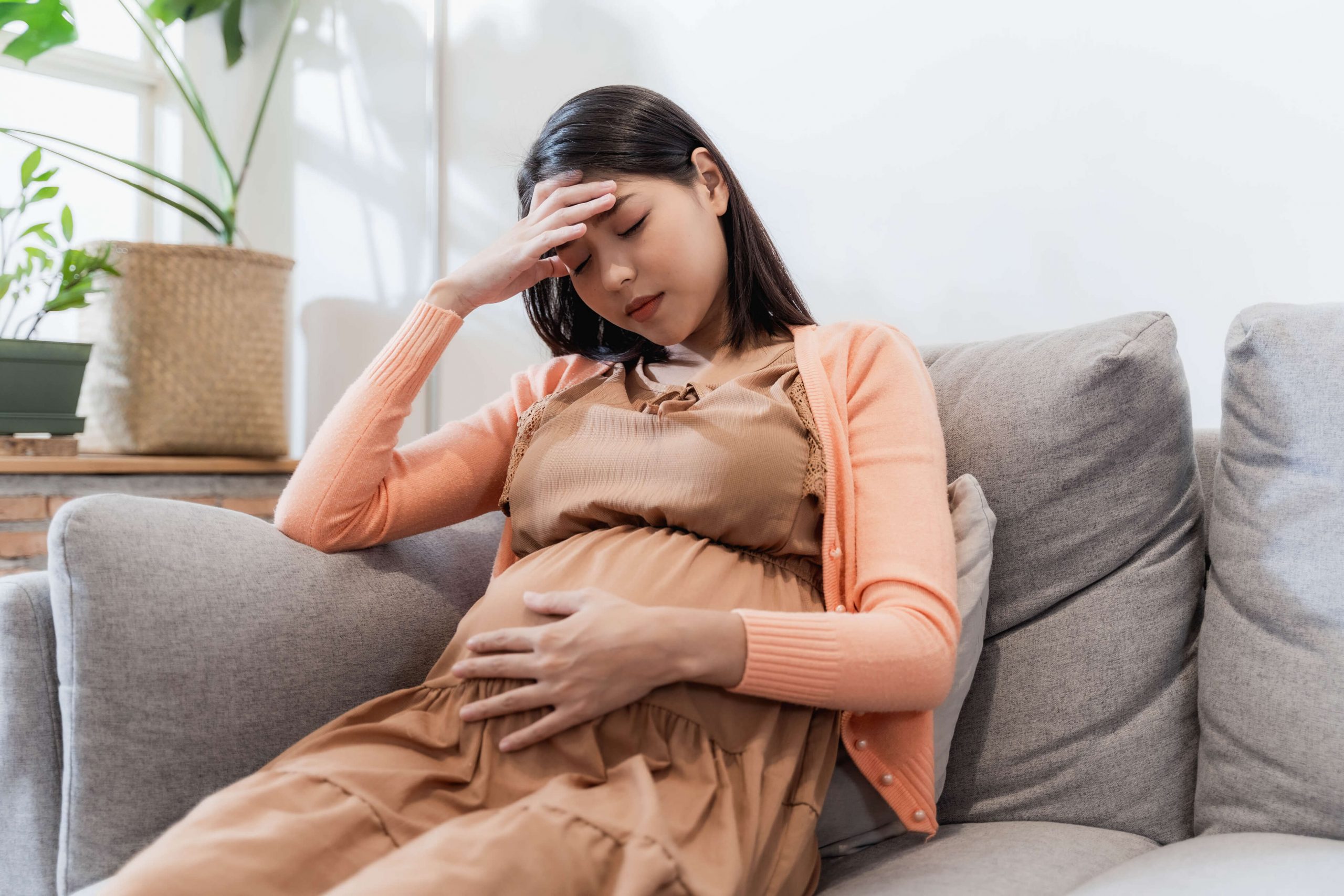


Medically reviewed by Dr. Sim Hsien Lin, Consultant General Surgeon (Colorectal Surgery)

Haemorrhoids, also called piles, are swollen blood vessels in the lower part of the rectum and anal canal. They vary in size and can be either inside or outside the anus. They are a common phenomenon that can affect anyone at any age. Females are at an increased risk for developing haemorrhoids during pregnancy, especially in the third trimester. It is estimated that up to 50% of pregnant women develop haemorrhoids. Pregnancy haemorrhoids are similar to the ones that develop in other individuals.
Haemorrhoids are caused by the increased pressure in the veins that run through the rectum and anal canal. The enlarging uterus and the growing baby both cause increased pressure to the pelvic area, leading to swelling of the veins.
Another cause of haemorrhoids in pregnancy is constipation that occurs as a result of hormonal changes. The bowel movements slow down during pregnancy which causes constipation, leading to increased straining to pass the hardened stool. Veins of the rectal area swell up due to the extra pressure. Iron supplementation during pregnancy can also cause constipation.
The increased levels of progesterone hormone during pregnancy relax the muscles in the walls of the veins, allowing them to swell more easily. There is also an increase in the total volume of blood during pregnancy that enlarges the veins. Prolonged periods of standing or sitting and straining from carrying the extra weight of the baby can also lead to the development of haemorrhoids.
Pregnant women are also likely to develop haemorrhoids if they have had them previously, which are typically a short-lived problem that goes away after pregnancy.
Haemorrhoids in pregnancy usually start at around the 28th week of pregnancy (third trimester) although they can even appear earlier. It can also appear during or even shortly after childbirth.
The most common presentation of haemorrhoids is bleeding during defecation. The bright red blood is not mixed with the stool but rather coated on its outer surface. It can also be noticed during cleansing after bowel movements. Some patients do complain of mild stinging pain and itching after passing stool. Swelling and burning sensation around the anal region or a raised area of skin can also be noticed. If a blood clot develops in the haemorrhoids they become more painful, hard, and inflamed. A severe degree of pain may not always be a result of haemorrhoids but due to anal fissures or infection of the anorectal region.
Pregnancy haemorrhoids will typically resolve by themselves after childbirth. The symptoms associated with haemorrhoids can be relieved by natural and self-care methods. Seek help from your healthcare provider before starting any natural remedies or if the symptoms of haemorrhoids are persistent. Untreated haemorrhoids worsen with time and can lead to complications.
Read on to learn more about several treatment options to manage and treat haemorrhoids in pregnancy.
Try not to sit or stand for prolonged periods. Brisk walking or a 30-minute exercise can aid bowel movements. You should also avoid standing for long periods of time as it can cause increased downward pressure in the blood vessels of your pelvic region. When feasible, lie down on your side. To improve blood flow, sleep on your left side with your legs tucked towards your chest. You can also do Kegel exercises daily by squeezing and relaxing the muscles in your vaginal and rectal area. This will support your rectum by strengthening the pelvic floor.
Incorporating more fibre-rich food in the diet increases the bulk of the stool and softens them. This makes bowel movements easier and will reduce the pressure on haemorrhoids. Fresh fruits, vegetables, whole grains cereal, and bread are some examples of high-fibre foods. Drinking plenty of fluids also helps to keep the stool soft. Ask your doctor for safe fibre supplements that can be used in pregnancy.
Sit in a large bowl or bathtub filled with warm water, with or without added salt, for 20 minutes. This should be done after each bowel movement and an additional 2 to 3 times daily. Gently pat dry the anal area after each sitz bath, as excess moisture can lead to irritation. Do not wipe hard or rub vigorously. Sitz bath can relieve irritation, itching, and spasms of the anal sphincter. You can purchase the tubs or basins for sitz baths at most drug stores and they fit over the toilet seat.
Pass stool as soon as you feel the urge, if not the stool can lead to increased pressure and straining. Try not to sit in the toilet for prolonged periods as it will cause haemorrhoids to swell up. Elevate your feet with a stool as you sit which allows for easier bowel movements and maintain anal hygiene each time you pass stool. Use baby wipes or a cotton cloth soaked in warm water instead of normal tissue paper. Aloe Vera gel, aqua jelly or petroleum jelly can also be used afterwards.
Consult your healthcare provider before taking any medication during pregnancy.
Topical anti-hemorrhoidal agents like anaesthetic creams and steroid creams can be used to provide short-term relief from pain, discomfort, and bleeding.
Anaesthetic creams containing lignocaine can alleviate the pain associated with haemorrhoids while hydrocortisone-pramoxine creams will reduce pain, itching, and inflammation associated with haemorrhoids.
Laxatives, stool softeners, or suppositories that are safe to use in pregnancy can reduce constipation.
Rubber band ligation involves placing a small rubber band at the base of the haemorrhoid which will cut off the blood flow into the area. Haemorrhoids will eventually shrink due to the formation of scar tissue that will prevent recurrence in the area. The session may be repeated few weeks later if symptoms persist.
Surgical procedures are reserved for women who have persistent symptoms despite weeks of conservative management. They are not the preferred option but are not uncommon to perform during pregnancy.
Hemorrhoidectomy is a surgical procedure performed under general or spinal anaesthesia. This procedure is only recommended for symptomatic, recurring, or large protruding haemorrhoids. The procedure is associated with several risks like pain, bleeding, infection, recurrence and complications from anaesthesia as well as a longer recovery time.
Stapled hemorrhoidopexy involves pushing the haemorrhoids back into the anal canal and removing and fixing them with the use of staplers. It will treat bleeding or protruding haemorrhoids.
The post-surgical effects of haemorrhoid removal are dependent upon the procedure undertaken, how fast you heal, and the timing of your pregnancy. Even the least invasive procedures will require few weeks in recovery. Surgery performed in the third trimester may lead to changes in your birth plan, hence risks, benefits and timing of surgical treatment should be discussed with your surgeon and obstetrician.
Pregnancy haemorrhoid is a common condition that can be treated with home-based treatments and conservative management. Talk to your doctor if they fail to improve after treatment, if they recur or are associated with other complications. You cannot completely prevent the development of haemorrhoids during pregnancy; however, you can take measures to decrease the likelihood of its occurrence and severity. Pregnancy haemorrhoids are mainly caused due to constipation, so avoiding it is the key.




Dr. Sim Hsien Lin is a specialist colorectal surgeon in Singapore with over 10 years of experience in colorectal surgery. Her sub interests include laparoscopic colorectal surgery, transanal endoscopic microsurgery (TEMS), surgical management of piles, inflammatory bowel diseases and complex anal fistulas.
Read Full BioCome visit our clinic, which are equipped with modern and updated equipment, and a team that will take care of all your needs.
Dr. Sim became a Fellow of the Royal College of Surgeons (Edinburgh) in 2011, winning the Gold Medal award at the FRCS Exit Examination that year.
Dr. Sim firmly believes that transdisciplinary care is the key to supporting both the elderly and complex patients through their perioperative and recovery journey.
Dr. Sim firmly believes that transdisciplinary care is the key to supporting both the elderly and complex patients through their perioperative and recovery journey.
Book An AppointmentPlease fill up this form and we’ll get back to you shortly!

For quicker response, call us at+65 6261 9227

Chat with our friendly clinic staff through WhatsApp!